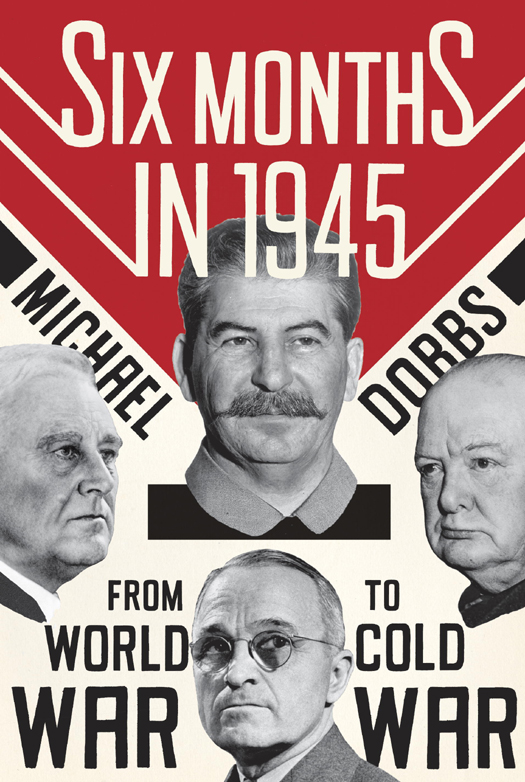
Six Months in 1945
FDR, Stalin, Churchill, and Trumam - from World War to Cold War
کتاب های مرتبط
- اطلاعات
- نقد و بررسی
- دیدگاه کاربران
نقد و بررسی

July 23, 2012
According to popular mythology, from February to August 1945 allied armies rolled to victory in WWII, but then ineffectual Western leaders caved in to Stalin, resulting in the cold war. Veteran journalist Dobbs (One Minute to Midnight) takes a more nuanced view and asserts that neither Russian nor Western leaders understood one another’s inner workings. In mapping a course for Europe, both Roosevelt, at Yalta in February 1945, and Truman, at Potsdam in July of that year, failed to sway Stalin from his desire to impose a Soviet sphere of influence on Eastern Europe. Critics labeled this a betrayal of democratic ideals, but the Red Army was on the spot, and no one supported a war to eject them. Skeptical of the great man theory of history, Dobbs thinks that the cold war was probably inevitable, and merely delayed by the presence of a mutual enemy. He says also that Stalin was not, like Hitler, purely autocratic, and operated within the Soviet Union’s own systemic constraints. His goal was to prepare for a new war with the West within the next 20 years, but Eastern Europe proved a persistent drain and the U.S.S.R.’s clunky command economy could not hope to satisfy its citizens. Dobbs offers an astute narrative of the six months that changed the world. 8 maps. Agent: Raphael Sagalyn, Sagalyn Literary.

September 15, 2012
A close look at one of the most consequential six-month periods of the last century. In the six months following the "Big Three" conference in Yalta in February 1945, Franklin Roosevelt died and was succeeded by Truman, Germany surrendered, the United Nations convened in San Francisco, Churchill was turned out, and the atomic bomb was tested and then dropped on Japan. Yalta seemed to produce broad agreements on strategies to end the war and cooperate in the occupation of a unified Europe. By the time the newly constituted Big Three met again in Potsdam in August, however, Germany and Europe were becoming irrevocably divided and world war was evolving into cold war, despite the intentions of all three leaders. In this elegantly written narrative, longtime journalist Dobbs (One Minute to Midnight: Kennedy, Khrushchev, and Castro on the Brink of Nuclear War, 2009, etc.) shows how the Allies' political and economic systems ultimately proved hopelessly incompatible. Words like "elections," "democracy," "fascism" and "freedom" meant very different things to the Soviets than they did to the Americans and British, leading each side to accuse the other of reneging on their commitments. Against a background of savage ethnic cleansing, Stalin imposed Soviet-style governments on territory held by the Red Army and pillaged surviving industrial equipment, while the Americans moved to keep German uranium and atomic scientists from falling into Soviet hands. When the Russians refused to supply Pomeranian grain and Silesian coal for western Germany and began interfering with access to Berlin, the alliance had clearly devolved into deadly rivalry. Dobbs delivers engaging portraits of the national leaders and often amusingly detailed accounts of their conferences, while demonstrating that "sometimes history has a mind of its own, riding roughshod over the decisions of the most charismatic personalities and moving in directions contrary to their desires." A confident and rewarding survey of a hinge point in 20th-century history.
COPYRIGHT(2012) Kirkus Reviews, ALL RIGHTS RESERVED.

May 1, 2012
In February 1945, when Roosevelt, Churchill, and Stalin met in Yalta, the start of the Cold War lay only months away. Dobbs, a former Washington Post reporter who covered the fall of communism and authored the best-selling One Minute to Midnight, about 1960s nuclear brinkmanship, should have the perspective to cover this story. Lots of in-house enthusiasm.
Copyright 2012 Library Journal, LLC Used with permission.

September 1, 2012
The author of several popular titles about the Cold War, Dobbs opens this book where the conflict began, in the Allies' acrimony over interpreting their agreements made at the end of WWII. Favoring a journalistic style that embeds the issues, such as Poland and German reparations, in atmospheric descriptions of the Yalta and Potsdam conferences' interior decor and meal menus, Dobbs lends the subject an immediacy that will engage history readers, who will be within earshot of leaders and their aides as they meet, adjourn, dine, and wrangle over the affairs of defeated Germany and its former empire. Stalin's negotiating advantages become evident in Dobbs' narrative, as does mounting British and American alarm about the Russians' failure, in their view, to fulfill their pledges. Dobbs does not limit the Western allies' growing irritation to the attitudes of Truman and Churchill; he adds those of officers in East Germany, Romania, and elsewhere, who witnessed Soviet methods of imposing Communist control. Concluding with the Potsdam conference's impasses, Dobbs delivers a readily accessible presentation of the onset of the Cold War.(Reprinted with permission of Booklist, copyright 2012, American Library Association.)

























دیدگاه کاربران